I was specifically reacting to his last point that minor nations only exist for flavour.
- 2
Please tell me the ways you can abuse AI so maybe we can find solutions, I know my idea isn’t perfect and is very rudimental but it doesn’t mean it can’t improve and maybe one day be integrated, also partially, into the invictus modYeah you have, haven't you? But that doesn't change my point of view. Playing with minor nations is something you will do for a challenge, not a normal playthrough -at least on average.
Also sure, more strategies to even the score for minor nations and tip the balance back and forth without middle ground in sight. I am not saying the idea is inherently bad it has some good points. However, if I read it and all I think about the number of ways I can abuse AI - that is already abusive enough, than all I can think about it being great in MPs but not so much in SPs - which is how I prefer to play Paradox games
I won't answer for him, but the main reason I disagree with your suggestion isn't on its merrit but the way this game is designed. The game is still very much a snowballing mappainter. Everything in this game still funnels into war and conquest.Please tell me the ways you can abuse AI so maybe we can find solutions, I know my idea isn’t perfect and is very rudimental but it doesn’t mean it can’t improve and maybe one day be integrated, also partially, into the invictus mod
The game is still very much a snowballing mappainter.
I agree with all you say. One of those mechanics to limit too fast expansion would be the war exhaustion rework I have suggested, so you wouldn’t want partecipate into too many wars one after another (especially costly wars) to avoid reaching war exhaustion cap which as I have said obligate you to unconditionally surrender to all nations you are at war with (a sort of collapse mechanic, like the German Empire surrender in WWI to find an example). Also a revolts rework would be very welcomed (see my Rebellion rework suggestion for some thoughts about this).@Kadanz explained very well, probably even better than I would, what is bothering me.
It boils down to this. @Karalis123 and I may be wrong but those changes at least when I think about them on a high-level overview just make it even prominent. We need more mechanics that would deliver the real consequences of the aggressive expansion and the vast spread of an empire.
I never attempted to mod the game, I don't know the limitations, alas, I just personally think that the focus should be (with what already is possible in the game) to make waging wars and conquest a little bit more daunting move with impactful consequences to stability (as close as possible), rather than what at the moment is. That's all and if I overly was too aggressive, sorry, I didn't mean to bash on anything.
As far as I know the province capital sets to the most populous area on a peace deal (though not always for some reason). The easiest way to prevent it is to move pops away/to from the old and new province capitals respectively.Are you guys able to do anything about the longstanding bug where if a player moves a province capital, the capital switches back to it's original location? This bug has been around for awhile, and I doubt Paradox is going to do anything about it at this point. But not sure if that aspect is moddable. Thanks!
Unless you're referring to the Diadochi Empire tree wherein you reunite the Argeaed empire, it is not the case that Epirus gains access to the Macedonian mission trees.Epirus gains access to the Macedonian missions once the mission tree is complete, so they already have content after conquering Magna Graecia and Macedon.
Are you guys able to do anything about the longstanding bug where if a player moves a province capital, the capital switches back to it's original location? This bug has been around for awhile, and I doubt Paradox is going to do anything about it at this point. But not sure if that aspect is moddable. Thanks!
I agree it should be at least partially integrated, its a very good modFor the rework of war exhaustion/overextension you guys can check out the stratera balance mod on workshop, I think it provides a challenging playthrough for large empire that your nation can collapse at any size without good happiness management
I think it is your best dev diary after the last one on Sardinia (since I’m from Sardinia). When all of this will be playable?Dev Diary 13: Building Rework + New cultural inventions + Patch notes
Today we'll be talking about a building rework, new cultural inventions for various cultures and the latest patchnotes.
But first, we're looking for Artists (mainly 3D artists who can make models) and Testers who can provide feedback to our various changes and mission trees in development. If you're interested, leave a message here: https://discord.gg/NJWZtAACgK for the testers there is no real technical skills required.
But now, onto our Building rework.
Kali Spera! This is Hannibal_theCannibal (traced_169) back again this week to talk about some exciting new changes that will affect ALL players! We’ve received feedback from the community that, at present, the reduction of Metropoles from Rank 3 to Rank 2 and Cities from Rank 2 to Rank 1 has severely reduced the number of trade goods available. This change to trade good production has had a knock-on effect on economy, diplomacy, and long-term strategic planning. Some people weren’t happy with the somewhat sudden shortage of goods while others were pleased that the market is no longer absolutely flooded with goods as was the case in Vanilla. We’ve been discussing at length on how to best achieve a middle ground and the direction we’ve taken is a slight rework of buildings. In addition to addressing some general balancing concerns and shaking up certain multiplayer metas, it’s our hope that by changing the costs, build times, and effects of buildings, we can help to generate more trade goods in territories where players invest as well as provide more paths for civilization customization. I’ll be going one by one through each building as part of this dev diary and you’ll notice that while most buildings have *something* adjusted, very few buildings are *radically* changed.
General changes:
It may be helpful to first speak about changes to base cost for each of the buildings. To streamline this process, consider each of the city buildings into tiers 1, 2, and 3 based on the build cost. Since we’ve also changed the base costs of settlement buildings as well, it may be helpful to also think of them as Tier 2 (with one exception). Moving forward, Tier 1 buildings will have a base cost of 80 gold (down from 100 gold). This should help smaller nations who have less money available to them to more easily build them and make the choice of building multiples of these buildings more appealing. Tier 1 buildings include the granary, library, marketplace, training camp, tax office, AND the tribal settlement. Regarding the last building, it was noticed that very few tribes had the funds to build multiple tribal settlements and their use was limited (even for tribal nations). With the smaller cost, we’re hoping to see more of the built for players that want to develop their tribal lands a bit.
Tier 2 buildings will have a base cost double that of tier 1, which is 160 gold (up from 150 gold for cities, down from 200 gold). Most tier 2 city buildings have received some slight effect boosts to help compensate for the increased cost while the settlement buildings have received a 20% reduction in their base cost. This price reduction will help speed up the development of territories which, among other things, speeds up trade good production. Tier 2 buildings include Fortresses, Ports, Academies, Courts of Law, Forums, Mills, Barracks, Mines, Slave Estates, Farming Settlements, and Provincial Legations.
Tier 3 buildings will have a base cost double that of tier 2, which is 320 gold (up from 320 gold except for Earthworks, which goes up to the Tier 2 cost of 160 gold). Tier 3 buildings are the most powerful, locked behind tech, and are typically some of the most spammed buildings in wider empires. The price increase is small but will help to curb the speed with which they are spammed. Note, most Tier 3 buildings haven’t changed much except for the Foundry, which is arguably the most significant change in rework. Tier 3 buildings include Earthworks, Foundries, Great Temples, and Grand Theaters.
Fortress:
- We’ve increased the civ boost from 1% to 2% to be in line with tier two buildings

Port
- We’ve replaced the +1 pop capacity modifier with two new effects: +3% to civilization value and +5% local trade routes modifier. This will slowly help to accomplish the goal of population increase from the previous modifier while also increasing the output and commercial gains you'd expect. Additionally, stacking ports now will be a more viable strategy, allowing for relatively lucrative cities (though not as much as other specialized builds) due to the civ value effects and increased trade.
- We’ve added a max amount of 6 port levels per city. This is both practical, as there's virtually no reason to build more than 6 ports in their current state and balanced, as 6*3 = 18% civ increase in total from 6 buildings costing 150 gold base each. This is in line with the civ increase and costs from 6 of Tier 2 city buildings.
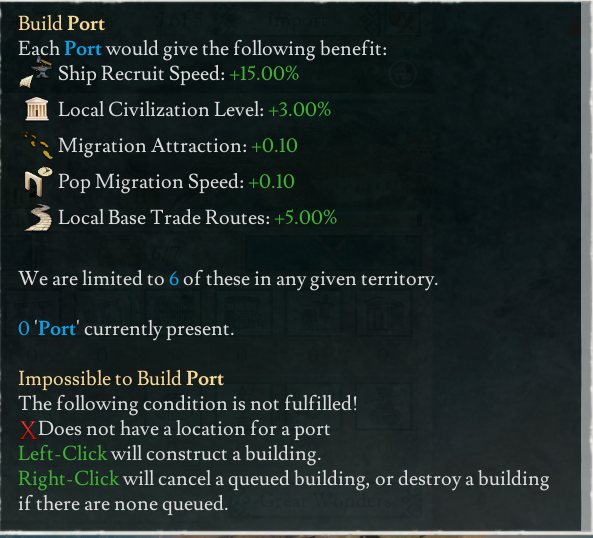
Aqueduct
- We’ve decided to remove the civilization malus that Invictus previously introduced due to some valid concerns on the forums and discord. However, there will still be some drawbacks introduced to this building in order to prevent an aqueduct spam meta.
- Aqueducts will now take 720 days to construct, similar to fortresses.
- Aqueducts will now be limited to a maximum of 15 in a city. For those of who noticed the historical nod, this is to prevent any city from having more aqueducts than Ancient Rome had. It will also serve to set a maximum limit on potentially game breaking mega-city metas.
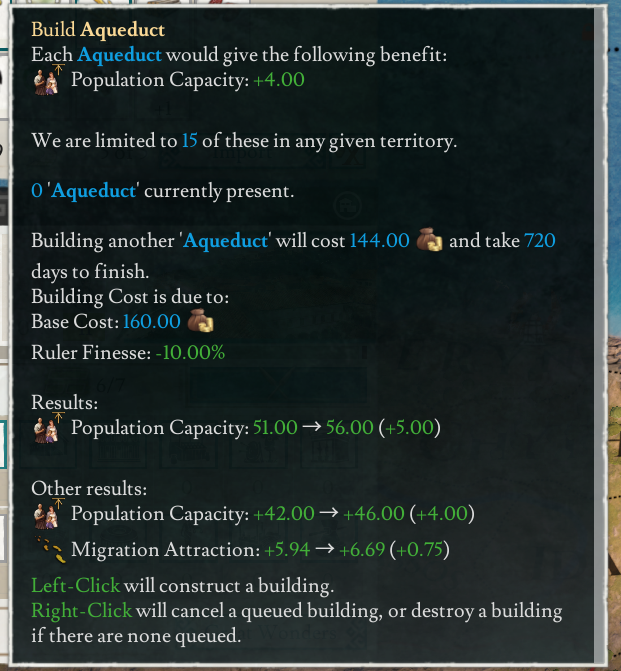
Granary
- Granaries are typically built only in three cases: as required by missions, in early game when food sources are scarce (though this has been made more important by the Invictus food changes), and mid/late game to help drive up population. That being said, granaries are still commonly ranked among the worst types of buildings by players and their impact requires some tweaking.
- Granaries will now give 300 provincial food capacity instead of 200. Granaries will also get an additional +1% monthly food modifier. With these changes, provinces with granaries are more likely to survive the harsh winter effects introduced by Invictus and will help cities to flourish a bit more.
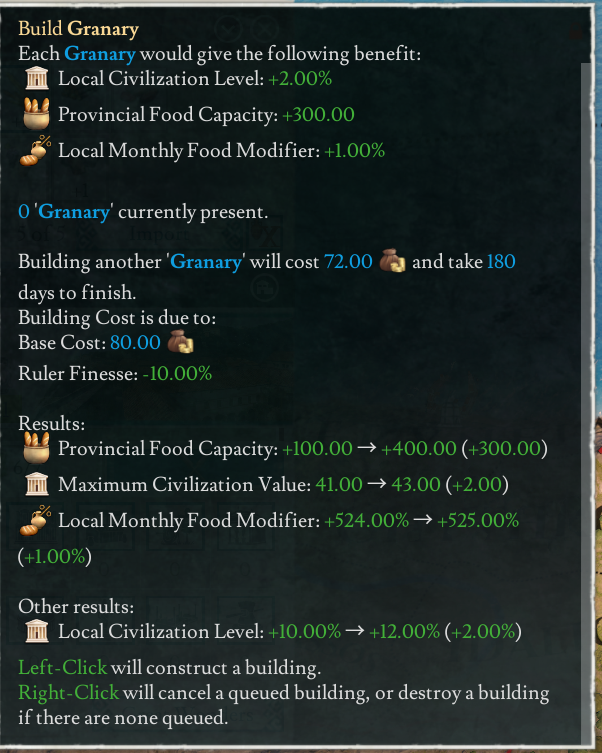
Library
- Libraries are great and thus, no changes have been made besides the Tier 1 cost reduction.
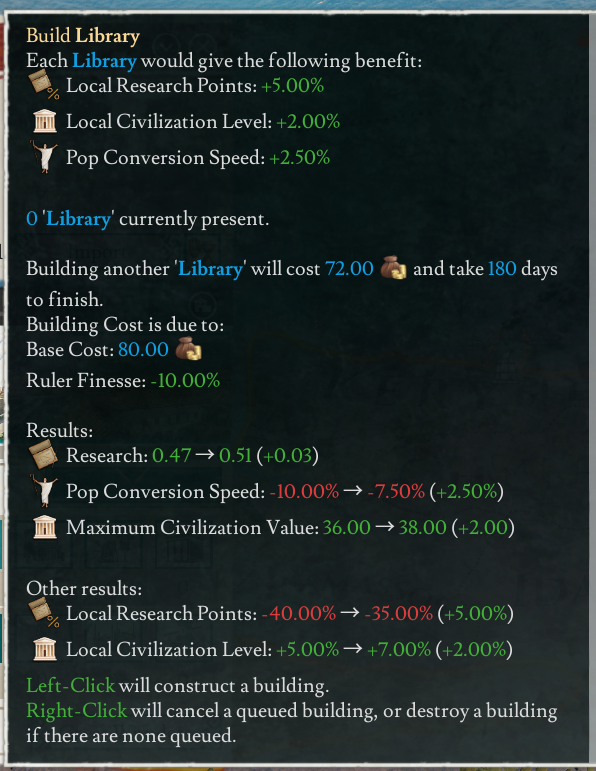
Marketplace
- Feedback indicates that, outside of the capital province and the occasional city that needs some extra help assimilating, marketplaces are some of the least built buildings. This makes sense, as when you run the numbers, the actual benefit you get from the +2.5% Local trade routes is absolutely abysmal. Compared to the comparably high building cost and the necessity for nobles/citizens to make an impact, the vanilla marketplace is simply a poor choice of money. With libraries, all research bonuses accrue to the decimal but the same is not true for marketplaces. With trade routes, you either have 1 or 2 trade routes, with nothing in between. This means you MUST pass the threshold in order to feel ANY effect from this building and thus, a small modifier increase does nothing most of the time.
- We’ve increased the local trade routes modifier from +2.5% to +7.5%. Now marketplaces, coupled with the ports, will allow nations who invest in their cities more access to trade goods outside of the civic provincial investment. With testing, this value may change, as the cheaper marketplace cost and bonus from ports might make 7.5% a bit too strong. Time will tell but this is for sure, marketplaces are certainly much more viable now.

Training Camp
- Based on feedback from the multiplayer community, we’ve reduced the manpower modifier from +10% to +7.5%. So while training camps are cheaper now, they’re less effective. Hopefully, this will curtail the mass training camp spamming we’ve seen in some multiplayer circles.
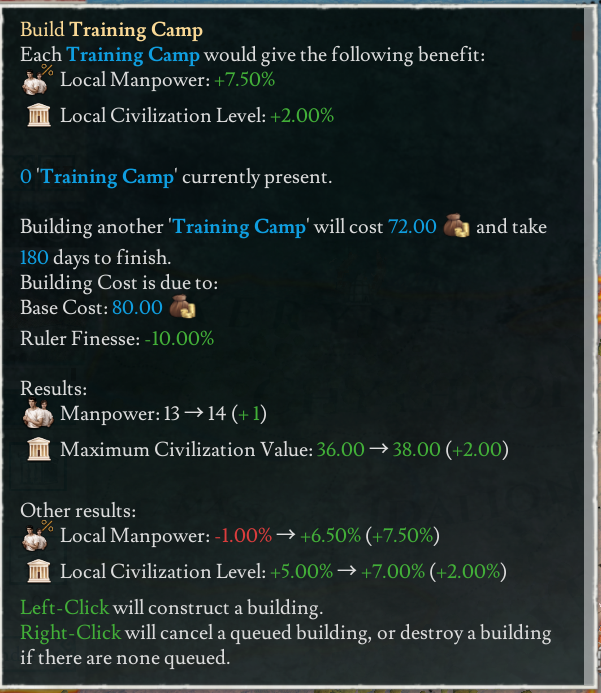
Tax office
- Tax offices are another building that doesn't get built often as they tend to have a poor ROI. The reduction in commerce in Invictus has made taxes a more important part of a nation's income, but tax is overall still lacking.
- We’ve increased the local tax modifier from 10% to 15% to help make this building more attractive. Coupled with the reduced cost, these buildings have a much better ROI now than they did previously.
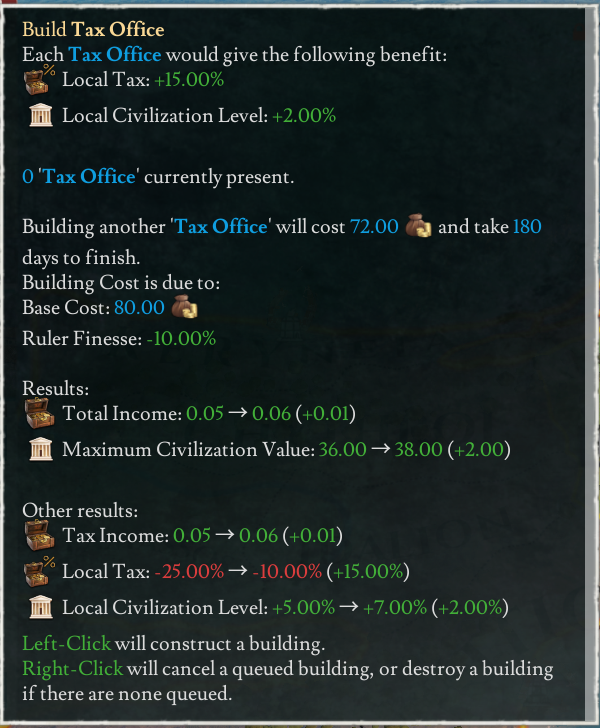
Academy
- No changes outside of the build cost
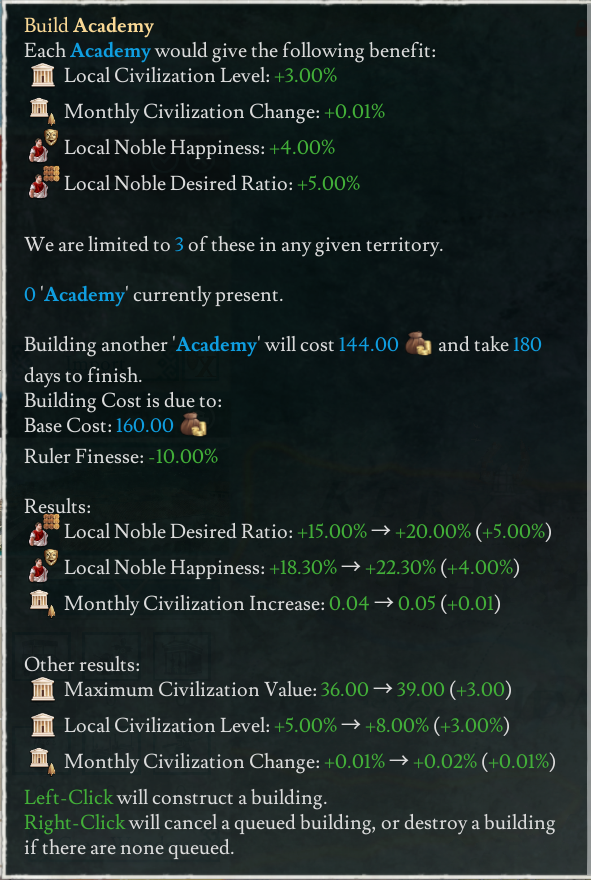
Court of Law
- This building is built primarily for the citizen desired ratio and as a result of mission requirements. However, the province loyalty modifiers have traditionally only been held by the two ‘Great’ buildings, which always seemed slightly off.
- We’ve increased the province loyalty modifier from +0.01 to +0.03. This increase makes sense thematically and can be stacked to a maximum of three times. In order to prevent abuse, the province loyalty bump to the Great Temple and Grand Theater will be reduced from +0.05 to +0.03. This means a city with 3 courts of law, a Great Theater, and a Grand Temple will yield +0.15 province loyalty whereas in vanilla, you’d get +0.13, which doesn’t seem game breaking.

Forum
- No changes besides base cost. With the increased importance of food due to seasonal harvest, this building got an inadvertent boost. We feel it’s pretty balanced as is for the moment.

Mill
- Mills are not a popular Tier 2 building. Unlike the other ‘pop ratio’ buildings, slaves provide no trade routes, nor research points, nor manpower. As a result, mills usually only come up in severe slave city builds and even then, only serve to drive up the pop ratio while providing some, though not much ROI, in terms of the slave output modifier. As the only other thing slave pops are associated with is trade good production, we thought it only made sense that the mills help in that regard.
- We’ve replaced the +6% slave output modifier with a -1 slaves required for surplus modifier. This accomplishes several goals: it allows for cities with high enough slave pops to become trade good powerhouses (albeit locked behind a cost of 450 gold versus the 300 gold from vanilla foundry, it allows the foundry to operate as the means to increase slave output thus increasing higher tax, and offers a realistic benefit to compete against manpower, trade route, and research production.

Earthworks
- Invictus has made changes to fort defense bonus and build time. Local fort defense has increased from +25% to +50%. We’ve also reduced the build time from 1440 days to 720 days, which we found was unnecessarily punishing.
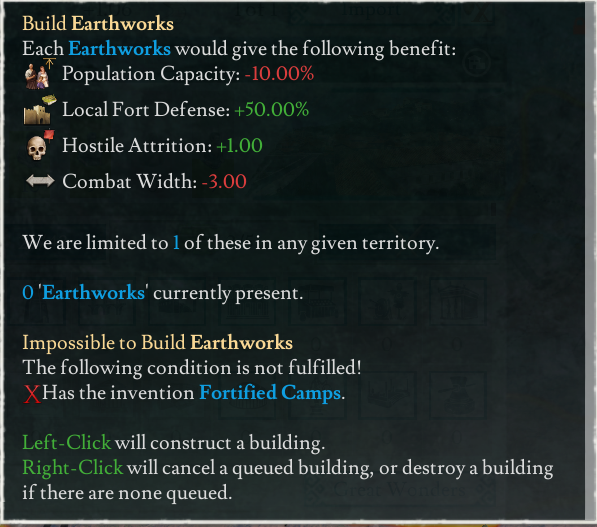
Foundries
- We’ve arrived at the big one. One of, if not the most spammed buildings in single player and multiplayer. The building with the most unusual and confusing while ridiculously strong effects. The foundry. Consistently one of the best buildings in the game, the foundry has tons to love. Perhaps too much to love. It's useful for nearly every single city and that's not necessarily a good thing. Additionally, the bonuses received are inconsistent and difficult to justify in terms of flavour. We’ve decided that a total rework of foundries is required from a flavour and balance perspective.
- We’ve increased the build time from 180 days to 360 days like the other Tier 3 buildings (except Earthworks).
- We’ve replaced the +25% research points effect with +5% freeman output. This increase in taxes and manpower should be ascribed to the increased efficiency of these pops due to high quality tools and materials they receive from the foundry.
- We’ve replaced the +25% local tax modifier with +5% slave output. As with the above bullet, this increase to production will yield more tax from the city but in a more sensible and believable way.
- We’ve replaced the -4 slave surplus with +1 base production. This is one of the biggest changes and is a direct result of the city nerf from Invictus. The thought here is that base production should be a less stackable modifier than slave surplus for larger cities and this building will still be prioritized for players who have a city with a particularly valuable trade good. Additionally, slave surplus modifiers are given to the mill, so this modifier needs to change in order to accommodate that. We anticipate foundries will still be good, and will be a go-to building in order to generate more trade goods and to increase the wealth of a city. However, it should be less effective in very high slave pop cities than it was previously and will help nations recover from the perceived lack of trade goods available on the market.
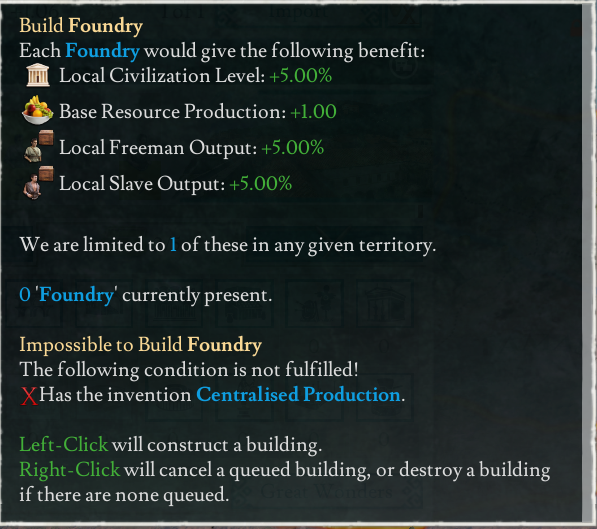
Great Temple
- A well beloved building, it's one of the most quickly unlocked tier 3 buildings and most built. Conversion is often the first step to assimilation and great temples are a nigh required step on the path to realm consolidation. Not much needs to change here honestly.
- We’ve reduced the territory loyalty from +0.05 to +0.03. This effect was slightly too strong along with the other effects and the court of law building will be buffed to compensate.
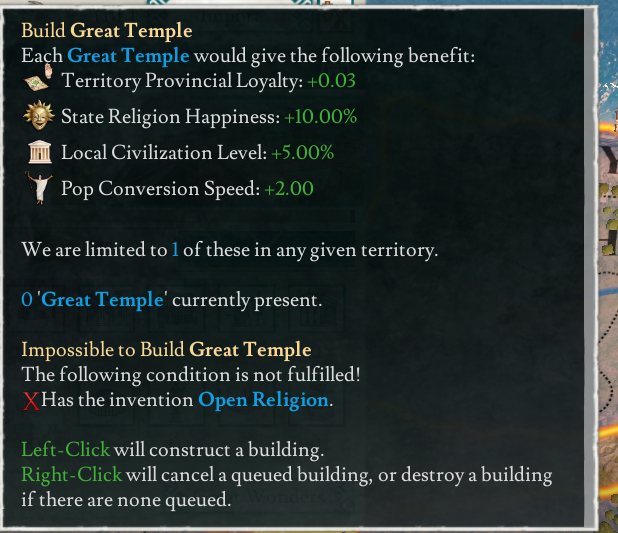
Grand Theater
- Similar to the Great Temple. We’ve reduced the territory loyalty from +0.05 to +0.03.

---Now, onto Settlement Buildings!---
Farm
- Only changes are +10% civ value and the base cost.
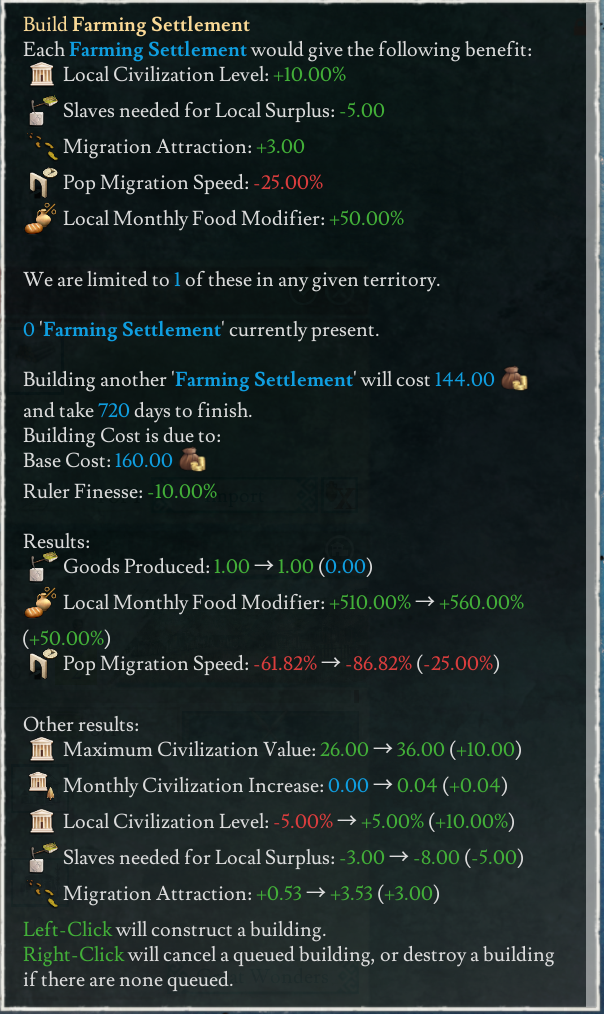
Slave Estate
- Only changes are +15% civ value and the base cost.

Mine
- Only changes are +10% civ value and the base cost.
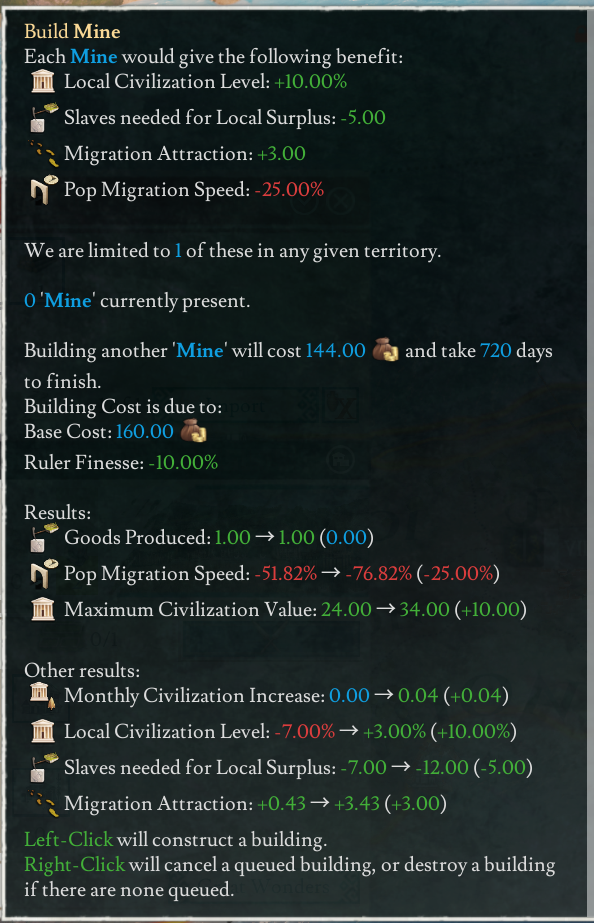
Tribal Settlement
- Only changes are +25% civ value and the base cost.

Provincial Legation
- +100% local pop assimilation speed
- +25% civ value
- Base Cost = 160

Final notes: The overall goal of these changes are to allow for tier 1 buildings to be more accessible to poorer nations, for each building to have better ROIs, to have each building feel like they're promoting a certain playstyle and allow for some unique conditions to arise, and finally, to give cities a path to trade good production that was lost during the city rank nerf. I believe these changes help to accomplish all of these goals without the introduction of new building types or a more dramatic overhaul.
---
Hello, this is Dustin. Stephan and I are back with some more cultural inventions as we push eastward along the map, with sets for the Persian, Meroitic and Aksumite, Arabian and Anatolian culture groups.
Like the Egyptians to the north, the Meroitic culture will have access to the Book of the Dead and Embalming inventions, meaning that Kushite players may also get the chance to mummify a prominent former ruler for the benefit of the kingdom.
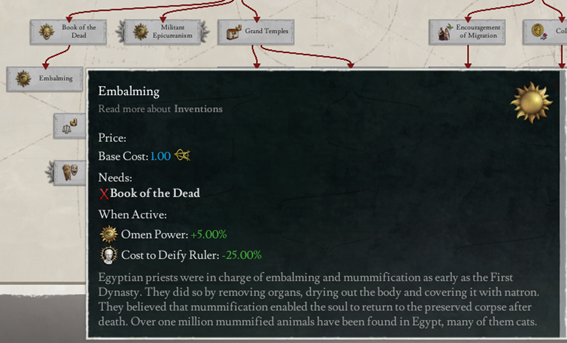
The Meroitic inventions also cover food production, Indian Ocean trade, ironworking and production.
The Arabian inventions also have a strong commercial focus to reflect the very lucrative spice, gum and incense trade networks of Felix Arabia. Like Meroitic and Aksumite nations, Arabian nations also have some naval support so they can defend their interests.

The restrictive effects of diplomatic and control range in the Indian Ocean are lifted for nations with Indian, Meroitic, Aksumite or Arabian primary cultures, which have exclusive access to the invention Monsoon Navigation, which will greatly increase their ability to interact with their neighbours in the east (numbers are not final and are for display purposes only).

The Babylonian island of Tylos also gets a unique invention, exclusive to its tag, celebrating its famous involvement in the Indian Ocean cotton trade.
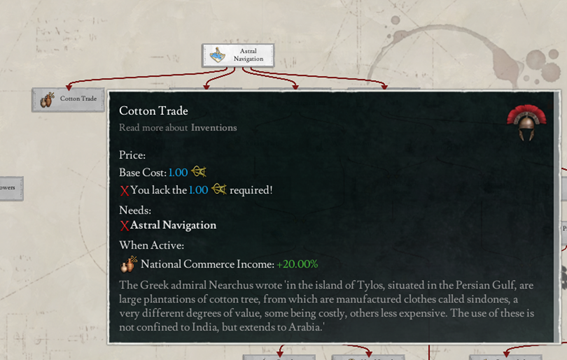
The Persian inventions focus on food production and population capacity through ancient irrigation and urbanisation techniques, infrastructure such as the postal system and the legacy of the Persian royal court, including the use of Aramaic as the administrative language of the empire.
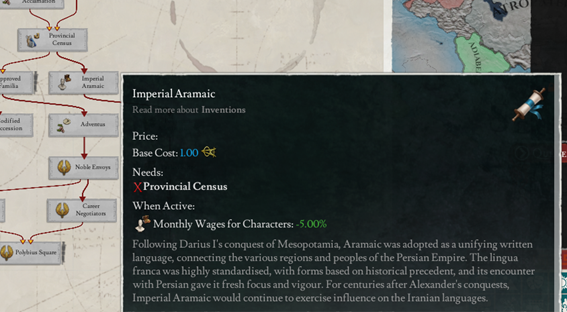
Via a special decision, players that have Patronised Persian Science and Literature will also be able to build their own lush garden in the capital, giving long-term local bonuses.
The Anatolian culture group shares a few inventions in common with the Persians in recognition of the dispensation under their former political overlords.
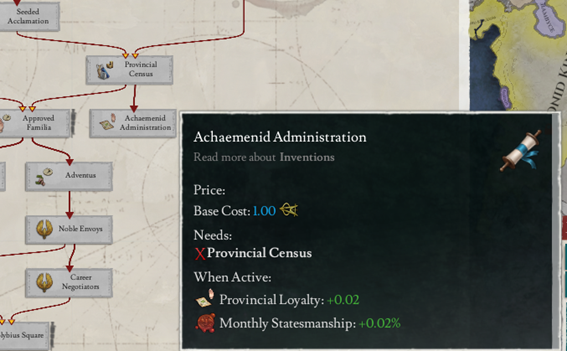
Anatolia’s role as the birthplace of metal coins for use in financial transactions is also celebrated.

Last but not least, several inventions are dedicated to the large Armenian culture group, including Martial Dancing, Armenian’s signature musical instrument (the Duduk) and Lacemaking.
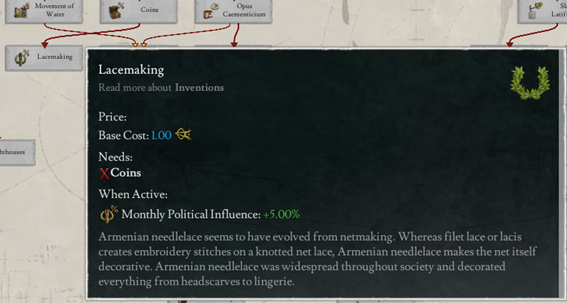
Now, we still have some patch notes from the 1.0.3 “Spartacus” update:
- Completely reworked how Slave Revolts work internally
(Basically a total internal rework, you now can get 1/3 slaves back and the victory event now fires properly after a month)
- Fixed being able to spy on people through the player mapmode
- Updated Spanish translation for Gamerules, Macedonian content, treasures, cultural decisions and more
- Improved all the localization for the new Carthage content
- Made the new Carthage tree possibly by changing a tradegood on the map
- Put Capua back in Capua, and Changed Ostia Antica to just Ostia
- Updated Hellenistic Empire tree to be more reasonable in conditions and effects
(mainly tweaking what regions exactly are given to each of the Satraps and the conditions for certain missions to appear.)
- Updated Epirote trees to give more reasonable subjects and have better demands
- Updated the Macedonian tree to now properly give the Empire government type
- Updated conditions for the Irish Albion formable so you can see the effects from the beginning
- Updated all Territory names to only use Latin characters
- Updated Seleucid Babylon tree to only require 85% cultural unity, down from 90%
- Fixed Seleucids declaring a normal war against Antigonids sometimes
- Fixed Seleucids Syrian missions checking Antigoneia instead of Seleukia Peria
- Fixed Antigonids collapsing when making Corinth a feudatory
(all territories can be owned by subjects too now)
- Fixed custom bloodline techs having wrong effects and not properly appearing
- Fixed Macedonian missions instantly cancelling for Nations like Epirus
- Slightly changed the conditions for getting Empire rank from Macedonian missions
(Antipatrid legacy isn't required anymore so Epirus should be able to do it)
- Fixed the Hellenistic Empire Satrapies so their primary culture is now integrated
- Fixed the Hellenistic Empire Satrapies so they no longer form nations and lose the Satrapy name
- Fixed the conditions for Restoring the Argead dynasty, you now need to own Pella and you will now always receive the right heritage
I think it is your best dev diary after the last one on Sardinia (since I’m from Sardinia). When all of this will be playable?
The only things I think should be adjusted are fortresses manpower malus from -5% to -10% to nerf a bit more their spamming and foundries should give +10% freemen output instead of only 5%
